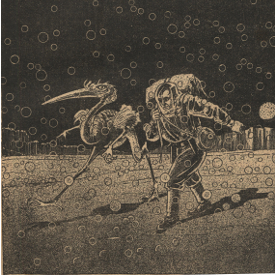Oh God, They Hate Me: Dealing with rejections
Welcome back to my weekly series on marketing and selling short fiction. These posts are written in a very specific sequence, with each entry building on earlier ones. You can read my earlier posts here.
Part 14 looked at how editors decide to select or reject a story. This week, we’ll discuss how to handle their most likely decision: a rejection.
Get Used to It
It sounds cruel, but my first advice is to get used to rejections. If you seriously pursue a writing career, then you’re going to get rejections. A lot of them. Many, many more rejections than acceptances. If you can’t learn to handle rejections–even expect rejections (yes, writers are sick puppies)–then just give up now.
If you think about it, the ubiquitous nature of rejections for a writer has an upside. Every writer gets them. Once you realize that, you won’t feel as if you are being singled out. You aren’t. It happens to all of us.
“But, but, but…why didn’t they like it?”
Your next lesson is that, in the vast majority of cases, an editor will not explain why they rejected your story. A typical rejection letter goes something like this: “Thank you for your interest in Awesome Possum. Unfortunately, your story does not meet our needs at this time.”
That’s it. Nothing about your story, what worked, what didn’t. Zippo. Rarely, you will get some specific feedback, but don’t expect it. More on that later.
It’s Not Personal
So some editor has now crushed your dreams without even telling you why. How do you deal with that?
First, understand that you weren’t rejected–your story was. An editor rejects a manuscript, not a writer. In Part 14, I explained that an editor rejects stories for many reasons. Yes, maybe your story was truly awful. Or maybe it was pretty good, but just didn’t stand out. Or maybe it was very good, but didn’t fit that editor’s needs for that issue or anthology.
The only thing a rejection tells you is that this particular story wasn’t right for this particular editor. Don’t read more into a rejection beyond that.
How to Handle Rejections: A Schizophrenic Approach
So all you know is that your rejected story lies somewhere between “horrible” and “great but not a fit.”
That situation is not new to a writer. When writing a story, a writer’s mind constantly swings between these same two extremes. At one end, we’re filled with an arrogant confidence that we’re writing a masterpiece. At the other end, our inner critic tells us that this story is crap and is going to need a complete rewrite. The truth generally lies somewhere in between.
But you don’t know where this rejected story falls. So when dealing with rejections, you need to follow two paths at once–the confident “masterpiece” path and the inner critic “crap” path.
Keep it in the Mail
The best response to any rejection is simple: keep your story in the (e)mail. In Parts 7, 8, and 9 of this series, I walked you through how to create your own list of top markets. So use that list. Send your story to the next market on your list, and do it right away.
Seriously, right away. Here’s what should happen. You get the rejection. You shrug. It’s a rejection. You expected that. Check your market list. Find your next market that doesn’t currently have a submission from you. Compose your cover email. Attach your manuscript (or however they want you to submit). Hit “send.” You’re done.
Remember, it’s a numbers game. The writer with the most stories in circulation will win.
What if your story is at the bad end of the spectrum? What if it truly sucks and no editor in their right mind would ever buy it? That’s a possibility, especially for your early efforts. But you’re the worst judge of your own work (see Part 7), so you can’t tell. Your story might be great and just hasn’t found the right editor yet. So the advice is still the same.
Keep it in the mail!
Keep Learning Your Craft
But, yes, your story might truly suck. Remember that writing is a craft–your chosen craft–and like any craft, you can always improve, and you will never ever completely master it. And if you’re a beginner, you have more room for improvement than other writers who’ve been working on their craft longer than you have.
So after you’ve submitted your rejected story to another market, work on your craft. Re-read your favourite how-to book, or find another one. Do some writing exercises. Whatever works to help you improve. Most importantly, write the next story. Writers write. The only way to improve your writing is to write, so…
Keep writing!
Dealing With Editor Feedback
On a rare occasion, an editor will actually provide you with feedback in their rejection note. Great, right?
Maybe.
If an editor says nice things about your story, they mean it! If they say they would like to see more from you, THEY REALLY MEAN IT!! Many beginners think that editors are just being polite when this happens. Go back and read Part 14. Editors are busy. Very busy. If they took the time to write you an encouraging note on a rejection letter, they mean it. Bask in the glow–and then send them another story right away. And move that market up to the top of your list.
Even more rarely, an editor might provide critical feedback on your story. Most editors will not. Why? First, they simply don’t have the time. Remember that an editor receives hundreds and hundreds of submissions for a single issue or anthology. Second, most editors have horror stories of abusive replies from outraged authors (newbies and never-will-be’s) verbally eviscerating them for having the temerity to criticize that writer’s perfect (in the writer’s mind) tale.
Never reply to a rejection note. Ever. Period. End of discussion. A nice “thank you for your kind feedback” won’t hurt, but busy editors likely won’t read it or remember you for sending it. And don’t ever try to argue with an editor, telling them why they’re wrong. They aren’t. It’s their opinion, whether you agree or not. And they will remember you if you argue with them, and not in a good way.
To Change or Not to Change
If the editor does comment on what worked or didn’t work for them in your story, whatever you do, do NOT revise your story to address that feedback.
Huh? (you say) What? Why not?
Because that editor is just one person. Their feedback is just one opinion. It’s too small a sample. I’ll give you an example from my very first story, “Spirit Dance,” for which I received the following two early rejections:
#1: “A nice effort but a bit too slow going in the first half for our tastes.”
#2: “Opens well, but doesn’t quite hold up to my expectations. Otherwise a solid effort.”
So exactly what change should I have made to “Spirit Dance” based on that feedback? One liked the opening but not the rest. The other didn’t like the opening, but liked it after that. Two diametrically opposed opinions. And their feedback reminds us that these are personal viewpoints: “for our tastes” and “my expectations.”
So I changed nothing. The story didn’t work for those editors for completely different reasons. I kept it in the mail. It sold after eight rejections to a professional anthology, giving me my first sale. That story, in its original form, has sold thirty-two times, been published in eighteen languages, and won the Aurora Award.
Keep it in the mail.
A Caveat
If you’ve accumulated multiple pieces of feedback (at least a half dozen) on a story that all cite the same specific problem, then fix that problem. Also, if an editor requests a rewrite, then, yeah (duh), do the changes.
But don’t ever revise a story based on an editor’s feedback and resubmit it unless they explicitly requested you to do so.
Stay Positive
I can give my credentials in two ways: I have three collections, over a hundred and fifty story sales in twenty-five languages and thirty countries, multiple award wins and short-lists, and over a million words of fiction sold.
Or, I could say that I’ve been rejected over eight hundred times.
Guess which version I use?
But understand this: they are two sides of the same coin. I wouldn’t have those sales if I hadn’t made almost a thousand submissions–submissions which also drove those rejections. You can’t separate success from rejection.
Keep it in the mail.
Next Week
Drawing the Line: When to stop submitting a story (hint: never, sort of)
As always, please feel free to add comments and questions, and I’ll respond as best (and as soon as) I can.
Some Personal News
I hope you’ll excuse a bit of personal news inserted here, news that is, at least, related to selling short fiction. My story “The Walker of the Shifting Borderland,” which appeared last year in issue #90 of the fine Canadian magazine, On Spec, has made the final ballot for the Aurora Award. More info on the Auroras is here. If you’re a Canadian, you’re eligible to vote for the Auroras (hint, hint).
~~~~~
PLAYING THE SHORT GAME — The Book!
I am thrilled to announce that I have now repackaged the 32 separate posts that make up this blog series into a book titled Playing the Short Game: How to Market & Sell Short Fiction. The book is completely updated and reorganized, with new material not in this blog series, plus an introduction from multi-genre, multi-award winning writer and editor, Kristine Kathryn Rusch. Here’s an extract from Kris’s intro:
Douglas Smith is the best person to write this book. … He’s one of the few people who has probably published more short fiction than I have, and in more countries, and more high-paying markets. He loves the short story as much as I do, and he’s good at writing them.
He’s just as good at the business side of the profession. He knows more about marketing short stories to other countries than I do. He understands how to manage short fiction contracts very well. He’s up-to-date on 21st century publishing practices, and he has a toughness that the best business people need.
We short story writers have needed a book like this for decades. I’m glad Doug decided to write it. Read and reread this volume. Because you’ll learn something each time you do. And take Doug’s advice. It’s spectacular.
—Kristine Kathryn Rusch
More information on the book, including full buying links for all major retailer sites, is available on my website here.
As a special offer to Amazing Stories readers, I’m offering discounts in my bookstore. Get the ebook or print edition at a discount by using the coupon codes AS-SHORT-E or AS-SHORT-P respectively at my website bookstore. Enjoy!











2 Comments